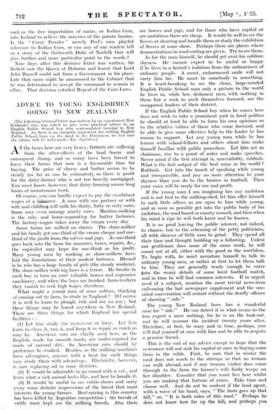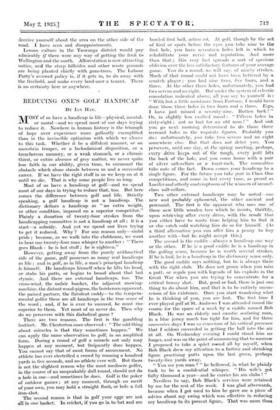ADVICE TO YOUNG ENGLISHMEN GOING TO NEW ZEALAND
[The following informal letter was written by an experienced New Zealander who was asked to give some practical advice to an English Public School boy who contemplated farming in New Zealand. As there is an energetic movement for settling English Public School boys cn the land in the Dominions we feel sure the advice will be welecmed.—ED. Spectakr.] AS the taxes here are very heavy, farmers are suffering from the after-effects of the land boom and consequent slump, and so many have been forced to leave their farms that now is a favourable time for buying. The price of cheese and butter seems to be steady (as far as can be estimated), so there is profit for the dairy-farmer who is not too heavily mortgaged. You must know, however, that dairy-farming means long hours of monotonous work. Of course, you can hardly expect to pay the exorbitant Wages of a labourer. A man with one partner or with wife and children will milk his thirty, forty or sixty cows. Some may even manage ninety cows. Machine-milking is the rule, and home-separating for butter factories. The factory-wagon takes away the cream every day Some farms are milked on shares. The share-milker and his family get one-third of the cream cheque and onc- third of the profit from the calves and pigs. As one-third goes back into the farm for manures, taxes, repairs, &c., the capitalist may hope for one-third as his profit. Many young men by working as share-milkers have laid the foundations of their modest fortunes. Blessed is he who has a large family of girls (the steady workers). The share-milker with big boys is a terror. lie breaks in each boy in turn on your valuable horses and expensive machinery, and when the boys are finished farm-workers they vanish to seek high wages elsewhere. What ought a young man of some culture, thinking of coming out to farm, to study in England ? Of course it is well to learn to plough, ride and use an axe ; but these things may be learnt anywhere in New Zealand. There are three things for which England has special facilities :-- (1) Let him study the motor-car or lorry. Let him learn to dean it, run it, and keep it in repair as much as may he. American cars are chiefly used here, as the English, made for smooth roads, are under-engined for roads of natural dirt. So American cars should by preference be studied. Besides, as the milking machines have oil-engines, anyone with a bent for such things may study them with advantage. Electricity, however, is now replacing oil in some districts. (2) It would be admirable to go round with a vet., and learn what a sick animal looks like, and how to handle it. (3) It would be useful to see cattle-shows and carry away sonic definite impressions of the breed that most interests the young farmer. Beef-raising in this country has been killed by Argentine competition ; the breeds of cattle most kept are the milking breeds. Also there are horses and pigs, and for those who have capital or are ambitious there are sheep. It would be well to see the fleeces at shearing and handle them or study the exhibition of fleeces at some show. Perhaps there are places where demonstrations in wool-sorting are given. Try to see them. As for the man himself, he should get over his sublime shyness. He cannot expect to be useful or happy if he lives in a hermit's isolation from the ordinariness of ordinary people. A sweet, embarrassed smile will not carry him far. He must be somebody in something. It is heart-breaking to see the clean, large-minded English Public School man only a picture to the world he lives in, while low, dishonest men, with nothing in them but a wish to push themselves forward, are the unopposed leaders of their district. If the English Public School boy when he comes here does not wish to take a prominent part in local politics he should at least be able to form his own opinions as to the relative values of those who come forward, and be able to give some effective help to the leader he has reason to support. Let any young man while he has leisure with school-fellows and others about him make himself familiar with public procedure. Let him act as chairman, rise to a point of order and make speeches. Never mind if the first attempt is, unavoidably, rubbish. What is the first output of the best mine in the world ? Rubbish. Get into the knack of speaking while young and irresponsible, and pay no more attention to your shyness than you do to the bruises in football. Then your voice will be ready for use and profit. If the young man I am imagining has any ambition and is not tied to the milking-shed, let him offer himself to such little offices as are open to him while young, and as soon as possible get into the public body of his ambition, the road board or county council, and then when his mind is ripe he will both know and be known. It is no good leaving the public interest, not indeed, to chance, but to the scheming of the petty politicians, all with sheaves of little axes to grind. They spend all their time 'and thought building up a following. Unless' our gentleman does some of the same work, he will count not at all, either with the good or the worthless. To begin with, he must accustom himself to talk to ordinary young men, or rather at first to let them talk to him. They are generally ready enough to enter into the weary details of some local football match, and in time he will find common interests. If in urgent need of a subject, mention the most trivial news-item enlivening the last newspaper supplement and the one- sided conversation will restart without the deadly offence of showing " side." The young New Zealand born has a wonderful nose for " side." He can detect it in what seems to the less expert a mere nothing, for he is on the look-out, and he will recount the incident twenty years after. Therefore, at first, be wary and in time, perhaps, you will find yourself at ease with him and be able to acquire a genuine friend. This is the end of my advice except to hope that the newcomer will not sink his capital at once in buying some farm in the wilds. First, he sure that in winter the mud does not reach to the stirrups so that no woman can walk abroad, and if any woman visitor does conic through to the farm the farmer's wife fairly weeps on her shoulder. Consider that you must live here whilst you are making that fortune of yours. Take time and choose well. And do not be content if the land agent, with a wave of his hand, says, " The farm goes up that hill," or, " It is both sides of this road." Perhaps he does not know how far up the hill, and perhaps you. deceive yourself about the area on the other side of the road. I have seen sad disappointments.
Lemon culture in the Tauranga district would pay admirably if there were any way of getting the fruit to Wellington and the south. Afforestation is now attracting notice; and the steep hillsides and other waste grounds are being planted chiefly with gum-trees. The Labour Party's avowed policy is, if it gets in, to do away with the freehold, and make every land-user a tenant. There is no certainty here or anywhere.











































 Previous page
Previous page